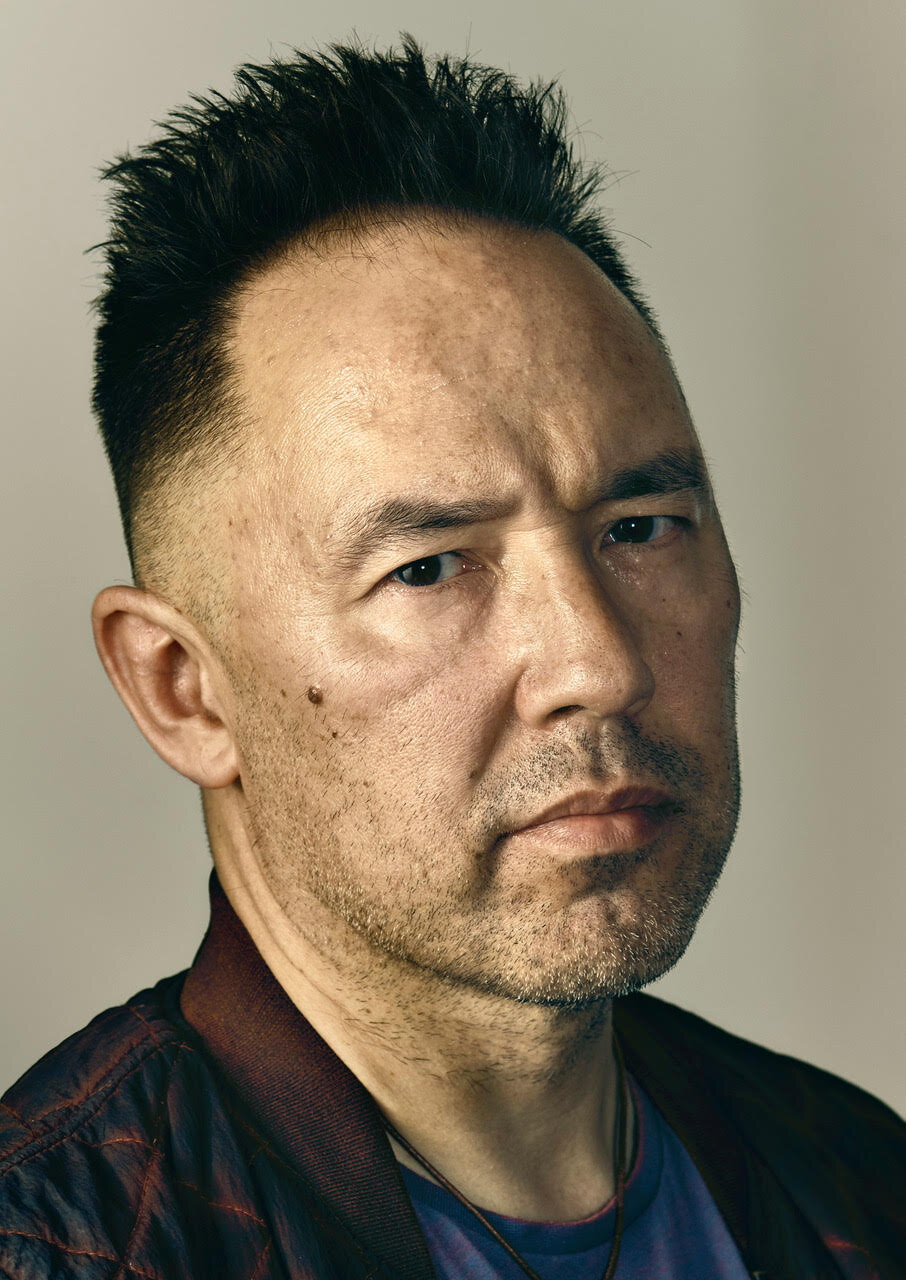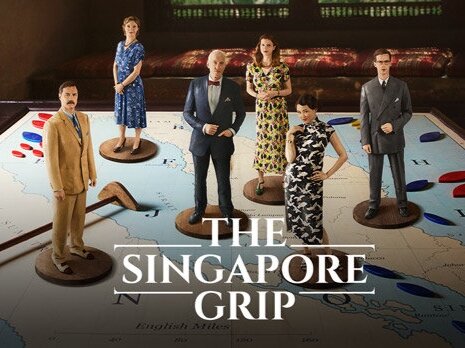Daniel York Loh on The Singapore Grip
Viv Yau talks to award-winning writer, actor and filmmaker Daniel York Loh on ITV’S latest TV drama: an adaptation of J.G. Farrell’s book, The Singapore Grip.
So The Singapore Grip is a book written in 1978 by J.G Farrell, which has been adapted into an ITV drama set. Can you tell us what you know about the title of this book and your overall impression of the first two episodes you’ve watched?
The title is fascinating. The fact that this is getting commissioned in 2020 is literally astonishing. [The phrase ‘The Singapore Grip’] is supposedly a trick that local prostitutes at the time performed with their vaginal muscles. Now, it's used as a metaphor throughout the book in terms of ‘the grip’ as the ‘colonial grip’. It’s actually fiction and is based on The Shanghai Grip. The Shanghai Grip is totally concocted. It was a British Secret Service fabrication. They concocted this idea of this Shanghai Grip technique to discredit Wallis Simpson, it’s an Orientalist fantasy. I find it concerning, especially anything to do with Asian femininity, The [British media] don’t portray any of us very well at all. You might just be able to get away with [the title], if the entire programme was about South East Asian sex workers and humanising them - though even then I don't know [why it would be used.]Within the book, there's quite a lot of detail - it’s about this family of rubber traders in Singapore. In the first part of the book, there's a lot of historical context - which all happens ‘off screen’ - but it’s not even off screen in the TV series, it’s just not there. There's a lot in the book about the fact that it's becoming difficult and quite competitive to be a rubber trader. And they've got this whole situation with labour strikes, and their indentured labour. But in the first episode, the whole thing just comes over as flippant and a bit silly. I think it was really badly adapted.
There is one Asian main character, Chinese refugee Vera Chiang played by Elizabeth Tan, who describes her character as ‘this complex, enigmatic character who stands up for the things that she believes in — she’s a wonderful example of a three-dimensional female character. In a period drama, it’s rare to find someone like that from an East Asian background.’ (Standard, 2020) Where do you think the potential issues are for how ESEA people, particularly women, are represented in British television?
In their publicity they try to spin Vera Chiang, as the main character. She's the only Asian character. She has this romance with a white man, Matthew. And he's played by actor, Luke Treadway. In the book, his character is not meant to be very attractive. This is Vera’s internal dialogue from the book in J.G Farrel’s voice: ‘How attractive he is, how stupid and short sighted. What deliciously round shoulders an unhealthy complexion. For the fact that this had been brought up, as Chinese girls had been for centuries, to find stooping, bespectacled, scholarly young men attractive. No doubt there was an economic motive originally buried somewhere beneath this tradition of attractive quality.’[The way ESEA people, particularly women are represented] is appalling. There is a paradigm for East and South East Asian women on British TV and that they're basically a trophy for white men. And ESEA males are either silent pimps or brutal oppressors. Credit: ITV
Elizabeth Tan has spoken about how ‘it’s a part of history that we know very little about,’ ‘We learn a lot about European history, about America, and yet the intricacies of Asian history we don’t learn much about. It’s a wonderful thing to have a broader view of the world.’ (Evening Standard) Do you agree that we’re bringing a broader view of the world?
No, it's a very narrow world, so it's a very narrow view of Singapore. It's a very narrow view of Asian people. It's a very, very narrow view of Asian women. It's regressive. Especially after Crazy Rich Asians - I’ve got issues with Crazy Rich Asians, don't get me wrong. But the Asian characters are human beings. And in that film they're empowered. They're strong. They're with other Asians, they're not running after white men. That's the thing that shocks me about The Singapore Grip. How resolutely old fashioned and archaic it is. Even take the race [issues] out of it. It comes across as misogynist. With the way the book describes women. Even the white girl, who is a horrible character. The book spends a long time describing her body. Another example, the description of the mother is, ‘You could tell she was beautiful once’. The show's writer Sir Christopher Hampton, said that ‘Any fair-minded viewer will easily understand that The Singapore Grip is an attack on colonialism’. How do you feel about this statement?
Well, the book is an attack on colonialism. There's no getting away from that. I'm spending a lot of time talking about it being old-fashioned. In a weird kind of way, the writer, for his time and for his mentality, is quite progressive. He views colonialism as a bad thing - but in a very patronising way. He doesn't give Asian people a voice. Georgia Blizzard, who plays the daughter of a British businessman living in Singapore, and Luke Treadway, who is one of the central characters, have both said similarly that: ‘It is showing that story through the lens of this wealthy British family and it's definitely not putting them on a pedestal, none of it is showing them in a good light, really. It's making fun of them and showing them for what they were - as these sort of arrogant, greedy, racist people.’ How do you react to these statements?
I don't really agree. A book can get inside the heads of characters. In a book you can actually write 700 pages about incredibly unattractive, nasty people - which is this book’s strong point. On screen, unfortunately, they will end up getting glamorised. For example, take the two young men in the book, Matthew Webb and Monty Blackett. Matthew is portrayed as the white saviour. In the book he is meant to be a bit fat and a bit ungainly. There is a bit in the book where Vera (the Asian woman) and the white woman are fighting over him. The white woman wants to marry into the family fortune. It's one of the more endearing bits in the book we got where Matthew goes ‘I’ve never been attractive to women in my life’. and he suddenly thought to himself. ‘Is this what being attractive to women is like? I'm not sure I like it.’Monty is a total racist pig. In the book he's described as ‘thickset’. I imagine him as this Eton rugby player from Hell. Obviously, they cast these high cheekboned, square jawed guys; it's just rubbish.Credit: PA Media
Why do you think we’ve got to this point where we’re seeing this story being told through white gaze?
I don't think we’re used to anything much different. And I think we've always had this thing where I think ESEA actors have been the puppets of white people. We have been the model minority on TV. The whole [criticism] about Mulan and [people saying] ‘I don't think we should be political’. I found that really fascinating. Because I do think all art is political. As soon as we show a presence, thought, dignity and an integrity, I think we do a lot better personally. With all my campaigning [work], I spend a lot of time in black spaces, black people are very, very empowered. They're very, very strong in what they believe and talk about it. And I always feel like we [as ESEA people] are still intimidated about talking about it. We’re worried that if we upset the white gatekeepers we might not get jobs any more.. There’s a lot of ESEA actors who are probably stuck in between wanting to stand up against systemic racism in the TV industry, versus trying to survive, and live. How does this affect ESEAs in the TV & Film industry?
That's a dilemma we have to [face]. I would say that if you're out there as a ESEA actor. I would say 70-75% percent of the stuff that comes towards you is inherently racist. So you've got a dilemma. You’ll think ‘Can I do this? Should I do this? Should I not do this?’ And it's a real problem. Young actors sometimes ask me, ‘should I do this?’ And that’s tricky. Sometimes you might feel you have to. And I would never want to tell an actor they shouldn’t take a job. But I would say be realistic about it afterwards.It's very, very difficult. I do think there's a point where we have to reject what we're given in a white racist structure. My career is a funny one. I've kind of escaped that in some ways, and I took a hard road and I turned a lot of things down or didn't turn up for auditions. And I spoke out about a lot. And that got me blacklisted by some people. But that also attracted other people. I don’t really think I can have a career as an actor. I don't fit one box or another. I'm mixed race. Even if somebody wanted to cast me, I don't know if they could. Why do you think there is such erasure of ESEA voices in the Arts?
One of the big reasons is that the way our upbringing and our immigration background works is we're very isolated from each other. That doesn't build strength. Black & South Asian people grow up in communities. ESEA people don't grow in communities particularly. And we've also had the model minority mindset thrust on us. Plus, a lot of our families come from inherently repressive regimes. What do you want to see on TV screens instead?
I want to see stuff that [ESEA people] make ourselves. That is about us without being about silly accents and who can speak the best Cantonese. It should be about us as a whole. There’s nothing I hate more than being the only Asian on set, the only Asian character, it’s horrible. I do think it's changing though. We see younger actors/activists coming up and they’re going to change the world. It’s very vibrant and it’s absolutely phenomenal what besea.n, End the Virus of Racism and ESEA Scotland are doing. It’s very heartening. As an actor Daniel has appeared at the Royal Court, Royal Shakespeare Company, National Theatre, Donmar Warehouse, Hampstead Theatre, Gate, Edinburgh Traverse and Nuffield, Southampton as well as in the films The Beach, The Receptionist and Scarborough. His first play The Fu Manchu Complex was produced at Ovalhouse. His second play Forgotten 遗忘 played at Arcola and Plymouth Theatre Royal in 2018. He also wrote for Invisible Harmony 无形的和谐 at Southbank Centre as part of the Chinese Arts Now Festival 2019 and for Freedom Hi 自由閪 for Papergang Theatre at the 2019 Vault Festival. He is one half of Moongate Productions who recently produced the digital new writing event We R Not Virus for which he contributed No Time For Tears. He is one of 21 ‘writers of colour’ featured in the best-selling award-winning essay collection The Good Immigrant. Short films include Mercutio’s Dreaming: The Killing of a Chinese Actor, Dream of Emerald Hill and Hall of Mirrors. He is a founder member of BEATS (British East/Southeast Asians in Theatre and on Screen).




